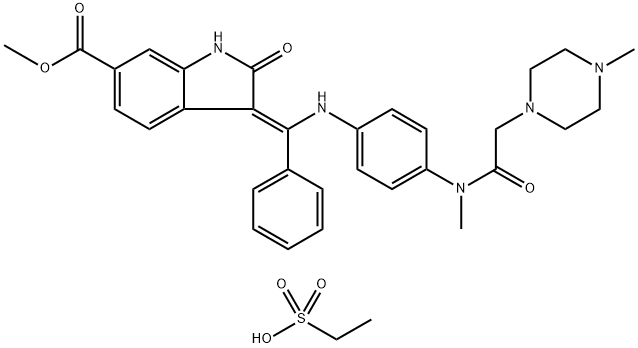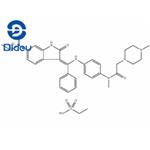Description
Nintedanib esylate is an organosulfonate salt obtained by combining nintedanib with one molar equivalent of ethanesulfonic acid. A kinase inhibitor used for the treatment of idiopathic pulmonary fibrosis and cancer. It has a role as an angiogenesis inhibitor, an antineoplastic agent, a fibroblast growth factor receptor antagonist, a tyrosine kinase inhibitor, and a vascular endothelial growth factor receptor antagonist. Nintedanib esylate (BIBF 1120 esylate) is a potent triple angiokinase inhibitor for VEGFR1/2/3, FGFR1/2/3 and PDGFRα/β with IC50s of 34 nM/13 nM/13 nM, 69 nM/37 nM/108 nM and 59 nM/65 nM, respectively.
Mechanism of action
Nintedanib Esylate is the salt form of Nintedanib. Nintedanib is a small molecule, competitive, triple angiokinase inhibitor that targets multiple receptor tyrosine kinases (RTKs) and non-receptor tyrosine kinases (nRTKs). Many of these RTKs are implicated in lung fibrosis and tumor angiogenesis, so nintedanib is used to treat proliferative diseases such as idiopathic pulmonary fibrosis, non-small cell lung cancer, and systemic sclerosis-associated interstitial lung disease. The specific RTKs that nintedanib inhibits are platelet-derived growth factor (PDGFR) α and β, fibroblast growth factor receptor (FGFR) 1-3, vascular endothelial growth factor receptor (VEGFR) 1-3, and Fns-Like tyrosine kinase-3 (FLT3). Nintedanib binds to the ATP-binding pocket of these receptors and inhibits their activity, thereby blocking signaling cascades that result in the proliferation and migration of lung fibroblasts. Nintedanib also inhibits kinase signaling pathways in various cells within tumor tissues, including endothelial cells, pericytes, smooth muscle cells, and cells contributing to angiogenesis, culminating in an inhibition of cell proliferation and apoptosis of affected tumor cells.




